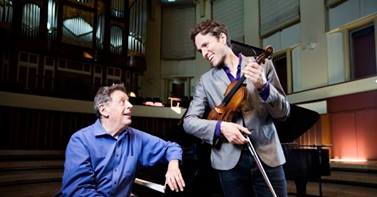Reflected in Glass: Philip Glass and the Next Generation
Friday, December 8, 2017 at 7:30pm
Zankel Hall at Carnegie Hall | 57th St. and 7th Ave., NYC
Tickets & Information:
www.carnegiehall.org (http://bit.ly/ReflectedinGlass)
Subscriptions now available; single tickets available August 28, 2017.
George Manahan, music director & conductor
Pauchi Sasaki, electronics and speaker dress
Tim Fain, violin
PAUCHI SASAKI: GAMA XVI for Orchestra and Speaker Dress with composer as electronics soloist
(2017, World Premiere, ACO/Carnegie Hall Commission)
BRYCE DESSNER: Réponse Lutosławski (2014, New York Premiere)
PHILIP GLASS: Violin Concerto No. 2, “American Four Seasons” (2009)
Conversation with Philip Glass and Pauchi Sasaki, moderated by ACO President, Ed Yim
Reflected in Glass is Philip Glass’ first concert as Carnegie Hall’s Richard and Barbara Debs  Composer’s Chair, which he holds for the 2017-2018 season. It features Glass’ Violin Concerto No. 2, “The American Four Seasons,” with Tim Fain as soloist. Glass’ work is paired with two composers he has mentored and inspired – Pauchi Sasaki and Bryce Dessner. Dessner’s Réponse Lutosławski is the creative fruit of his study of Lutosławski’s string orchestra piece Musique funèbre. Pauchi Sasaki’s GAMA XVI features the composer as electronics soloist, wearing and performing an original Speaker Dress made from 100 speakers.
Composer’s Chair, which he holds for the 2017-2018 season. It features Glass’ Violin Concerto No. 2, “The American Four Seasons,” with Tim Fain as soloist. Glass’ work is paired with two composers he has mentored and inspired – Pauchi Sasaki and Bryce Dessner. Dessner’s Réponse Lutosławski is the creative fruit of his study of Lutosławski’s string orchestra piece Musique funèbre. Pauchi Sasaki’s GAMA XVI features the composer as electronics soloist, wearing and performing an original Speaker Dress made from 100 speakers.
Philip Glass is widely regarded as one of the most influential musicians of our time. In the early 1960s, following studies at the University of Chicago and the Juilliard School, Glass spent two years of intensive study in Paris with Nadia Boulanger and while there, earned money by transcribing Ravi Shankar’s Indian music into Western notation. By 1974, Glass had a number of innovative projects, creating a large collection of new music for The Philip Glass Ensemble and for the Mabou Mines Theater Company. This period culminated in Music in Twelve Parts, and Einstein on the Beach for which he collaborated with Robert Wilson. Since Einstein, Glass has expanded his repertoire to include music for opera, dance, theater, chamber ensemble, orchestra, and film. ACO has a long history of performing Glass’ work frequently, going back to the world premiere of his first violin concerto written for the late Paul Zukofsky in 1987. ACO recorded Glass’ Heroes symphony in 1997 and most recently gave the U.S. premiere of his Symphony No. 9 at Carnegie Hall on Glass’ 75th birthday in 2012. Glass’ Violin Concerto No. 2 was written for violinist Robert McDuffie in 2009. The work is a companion piece to Vivaldi’s “Four Seasons,” but Glass states in the note for the piece that McDuffie and he did not agree on which movement corresponded to which season. He writes, “This struck me as an opportunity, then, for the listener to make his/her own interpretation. Therefore, there will be no instructions for the audience, no clues as to where Spring, Summer, Winter, and Fall might appear in the new concerto – an interesting, though not worrisome, problem for the listener.”
Pauchi Sasaki’s interdisciplinary approach integrates musical composition with the design of multimedia performances and the application of new technologies. A composer, performer, and improviser, she collaborates actively on projects linked to film,  dance, theater, installation, site specific, and interdisciplinary performances; Sasaki has performed internationally in Peru, the U.S., Japan, Spain, Chile, Colombia, and Switzerland. This year she was selected by Philip Glass to become his protégé as part of the Rolex Mentor and Protégé Initiative for a one-year mentorship. Sasaki’s classical violin studies began at age five; she studied Andean music at CEMDUC; classical music of North India with maestro Ali Akbar Khan in San Rafael, California; and Klezmer music with Alicia Svigals in New York. She holds a bachelor’s degree in Journalism from PUCP in Lima and a master’s degree in Recording Media and Experimental Music from Mills College in Oakland, California. Her compositions involve acoustic, amplified, and electronic instrumentation influenced by improvisational aesthetics and ethnic musical traditions. Her work also focuses on the development of real time interactive music and self-designed instruments using Max Msp and circuit bending. This branch of her work seeks the embodiment of electronic music performance integrating the emission of electronic sounds with corporal expressivity. Her piece for ACO, GAMA XVI, is a performative electroacoustic composition for orchestra and speaker dress – a wearable sound sculpture created with 100 speakers.
dance, theater, installation, site specific, and interdisciplinary performances; Sasaki has performed internationally in Peru, the U.S., Japan, Spain, Chile, Colombia, and Switzerland. This year she was selected by Philip Glass to become his protégé as part of the Rolex Mentor and Protégé Initiative for a one-year mentorship. Sasaki’s classical violin studies began at age five; she studied Andean music at CEMDUC; classical music of North India with maestro Ali Akbar Khan in San Rafael, California; and Klezmer music with Alicia Svigals in New York. She holds a bachelor’s degree in Journalism from PUCP in Lima and a master’s degree in Recording Media and Experimental Music from Mills College in Oakland, California. Her compositions involve acoustic, amplified, and electronic instrumentation influenced by improvisational aesthetics and ethnic musical traditions. Her work also focuses on the development of real time interactive music and self-designed instruments using Max Msp and circuit bending. This branch of her work seeks the embodiment of electronic music performance integrating the emission of electronic sounds with corporal expressivity. Her piece for ACO, GAMA XVI, is a performative electroacoustic composition for orchestra and speaker dress – a wearable sound sculpture created with 100 speakers.
Photo: Juan Pablo Aragon
Bryce Dessner is one of the most sought-after composers of his generation, with a rapidly expanding catalog of works commissioned by leading ensembles. Known to many as a guitarist with The National, he is also active as a curator – a vital force in the flourishing realm of new creative music. His orchestral, chamber, and vocal compositions have been commissioned by the Los Angeles Philharmonic, Ensemble Intercontemporain, Metropolitan Museum of Art (for the New York Philharmonic), Kronos Quartet, BAM Next Wave Festival, Barbican Centre, Edinburgh International Festival, Sydney Festival, eighth blackbird, So Percussion, New York City Ballet, and many others. He has curated Mountains and Waves at the Barbican, and founded MusicNOW in Cincinnati. Dessner now resides in Paris and has been increasingly active composing for major European ensembles and soloists. Last fall he premiered a new piece entitled Wires commissioned for Ensemble Intercontemporain and Matthias Pintscher, as well as recent solo works for violinists Pekka Kuusisto and Jennifer Koh, and a concerto for renowned pianists Katia and Marielle Labeque. Dessner’s Réponse Lutosławski was written as an homage to Witold Lutosławski͛’s composition for string orchestra, Musique funèbre. “This was an amazing process of discovering one of the 20th century’s great musical minds and allowing his adventurous spirit to influence my own musical decisions,” Dessner says. “I like to think that his music opened a window in a certain direction for me, or pushed open a door, through which I could then pass and take my journey with the music.”
Avery Fisher Career Grant-winning violinist Tim Fain was featured on the soundtracks to the films Moonlight, 12 Years a Slave, and Black Swan, where he also was seen on screen. Recipient of the Young Concert Artists International Award, he has appeared internationally as soloist with the Baltimore Symphony and Cabrillo Festival (Marin Alsop), the Orchestra of St. Luke’s, Pittsburgh, Hague and Buffalo Philharmonics, Mostly Mozart Festival Orchestras, and National Orchestra of Spain. His recitals have taken him to the world’s major music capitals, he has toured with Musicians from Marlboro, as a member of the Chamber Music Society of Lincoln Center, and around the globe in a duo-recital program with Philip Glass. He collaborated with Google on a Virtual Reality music video for his composition, Resonance, which introduced its 360 stereoscopic VR capability for YouTube, and was recently shown at The Sundance Film Festival. His multi-media solo evening Portals premiered to sold-out audiences on both coasts and continues to travel world-wide. Featuring a new work written for him by Philip Glass, Portals includes collaborations with Benjamin Millepied, Leonard Cohen, pianist Nicholas Britell and radio personality Fred Child. He has collaborated with an eclectic array of artists from Pinchas Zukerman and Mitsuko Uchida, to the Mark Morris Dance Group and New York City Ballet to Iggy Pop, Rob Thomas (Matchbox 20), and he has performed for the Dali Lama. His discography includes River of Light, (Naxos), and Philip Glass: The Concerto Project IV with the Hague Philharmonic and Tim Fain plays Philip Glass (Orange Mountain Music), and First Loves (VIA). Photo: Bill Bernstein


